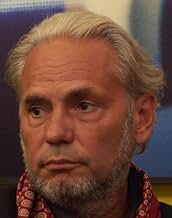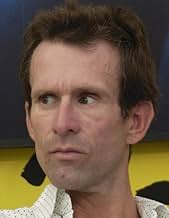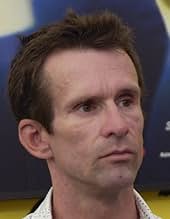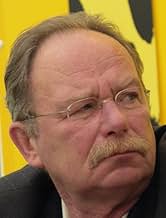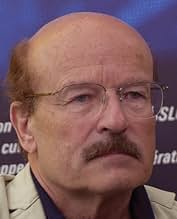A drama loosely based on Jean Bernard's Nazi-era prison diary.A drama loosely based on Jean Bernard's Nazi-era prison diary.A drama loosely based on Jean Bernard's Nazi-era prison diary.
- Director
- Writers
- Stars
- Awards
- 6 wins & 13 nominations total
Vladimír Fiser
- Bischof Kozal
- (as Vladimir Fiser)
Peter Varga
- Józef (Polish Inmate)
- (as Petr Varga)
- Director
- Writers
- All cast & crew
- Production, box office & more at IMDbPro
Featured reviews
7nmuk
This movie has been unduly panned by IMDb critics as being Catholic propaganda, when there is hardly any. It's actually an exploration of questions on faith and morality, viewed from the perspective of Rev. Henri Kremer, a priest who has been "on leave" from Dachau to convince the Bishop of Luxemburg to support Nazism, who has been a silent opponent all throughout. At one point the film even mentions that the Pope however congratulated Hitler on his birthday - that clearly indicates the acquiescence of the Catholic world - to me that's quite the opposite of propaganda.
**** SOME SPOILERS AHEAD **** The movie chronicles each of the 9 days that Rev. Kremer is allowed, and his conversations with Gestapo officer Gebhardt. When Kremer fails to convince the Bishop, he is persuaded to write a memo himself, given his own respectability due to his family status. In return he can have all the priests in Dachau released. Kremer at one point thinks he is being like Judas betraying the Christian cause (also to be noted that his personal cash upon release amounted to 30 marks), which Gebhardt, a former theology student himself, argues is a necessary evil, because without Judas there would be no martyrdom of Christ, and hence no Christianity. Rev. Kremer also learns that by giving Nazi policies the official blessing of Catholicism, he can be responsible for the deportation of thousands - although some 40 priests could be let go from Dachau. The resulting dilemma of Kremer dominates the movie.
Ulrich Matthes is very convincing in the role of Kremer with his sunken cheeks and eyes, and watch the young actor August Diehl in the role of Untersturmfuehrer Gebhardt.
**** SOME SPOILERS AHEAD **** The movie chronicles each of the 9 days that Rev. Kremer is allowed, and his conversations with Gestapo officer Gebhardt. When Kremer fails to convince the Bishop, he is persuaded to write a memo himself, given his own respectability due to his family status. In return he can have all the priests in Dachau released. Kremer at one point thinks he is being like Judas betraying the Christian cause (also to be noted that his personal cash upon release amounted to 30 marks), which Gebhardt, a former theology student himself, argues is a necessary evil, because without Judas there would be no martyrdom of Christ, and hence no Christianity. Rev. Kremer also learns that by giving Nazi policies the official blessing of Catholicism, he can be responsible for the deportation of thousands - although some 40 priests could be let go from Dachau. The resulting dilemma of Kremer dominates the movie.
Ulrich Matthes is very convincing in the role of Kremer with his sunken cheeks and eyes, and watch the young actor August Diehl in the role of Untersturmfuehrer Gebhardt.
I have no great sympathy for the Catholic Church, but I found the movie quite moving while watching it. There were some rank-and-file Catholic (and Protestant) clergy who spoke up against Nazism. They paid a heavy price - in part because there wasn't an outcry on the part of the higher-ups in the church hierarchy. They were more interested in keeping their perks and playing nice with the powers-that-be. This silent betrayal is very well conveyed in the movie.
Unfortunately some of the other dramatic elements don't work as well. I think the movie would have been stronger if Henri Kremer's relationship with his family -- his sister especially, who was willing to put her life on the life so he could flee to freedom -- had been more fleshed out. They don't even show their parting! So although I was interested throughout the movie, it was not quite satisfying.
Unfortunately some of the other dramatic elements don't work as well. I think the movie would have been stronger if Henri Kremer's relationship with his family -- his sister especially, who was willing to put her life on the life so he could flee to freedom -- had been more fleshed out. They don't even show their parting! So although I was interested throughout the movie, it was not quite satisfying.
It showed just all the considerations that the Vatican and the clergy had to make and how complicated and not black and white their decisions were based upon. Not everything is as obvious as it seems. And it was not a Catholic based excuse movie for decisions made, it was just the facts. And it wasn't just the church that had to make these difficult considerations in WW2, but many governments and institutions. When your dealing with a madman who can like current day Putin, kill tens of and hundreds of thousands of people because of a single slight, you certainly have to be careful in your decisions. Just as the NATO decision on a no fly zone over Ukraine decision is. Sure we want to do it but is it worth starting WW3 over? Decisions I'm certainly glad I'll never have to make.
10golomi
After reading some of the reviews below, I could not resist the frustration and decided to register and express my own opinion on the subject. First of all, it is a great movie, very humanistic and powerful. It is a movie about inner human struggle, it has nothing to do with church propaganda or any other nonsense so cheaply expressed by some "commentators". Being myself raised and atheist (in the former Soviet Union), subsequently going through Christian transformation but eventually abandoning it and becoming a naturalistic pantheist, I found the movie extremely resonating and devoid of any propaganda at all. It is a story about life the way it was, about people cast into the horror of the state machine, powerless and nearly broken. You will see no heroics, no pretty faces, no romantic interludes, only the bleak atmosphere and a masterful portrayal of the events. The most persistent feeling the movie leaves inside is the torturous question "What character could I actually be had I lived back then?" and the chilling realization of the answer "anyone of them." I only hope that the History is not going to repeat itself the way it always persistently did over the past millennium.
Most people are "conditioned" with the false sense of Hollywood "reality" in movies, but the real life is very different and this movie provides a great example of it. It actually is a big plus that the language is German, it adds a lot to the authenticity of the feeling. I have no difficulties following the English subtitles, the dialogs are sparse and do not divert from the main flow (needless to say, my native language is Russian). Finally, the soundtrack is simply incredible. The morons who call it "weak" should check the credits at the end the bulk of the sound uses Alfred Schnittke's symphonic works a perfect ornament to the gloomy and hopeless flow.
If you are looking for a movie to entertain yourself, you are definitely in a wrong place. By if you are like me, looking for a movie to enhance your soul and understanding of the drama of our life, then it is definitely worth checking out. 10/10
Most people are "conditioned" with the false sense of Hollywood "reality" in movies, but the real life is very different and this movie provides a great example of it. It actually is a big plus that the language is German, it adds a lot to the authenticity of the feeling. I have no difficulties following the English subtitles, the dialogs are sparse and do not divert from the main flow (needless to say, my native language is Russian). Finally, the soundtrack is simply incredible. The morons who call it "weak" should check the credits at the end the bulk of the sound uses Alfred Schnittke's symphonic works a perfect ornament to the gloomy and hopeless flow.
If you are looking for a movie to entertain yourself, you are definitely in a wrong place. By if you are like me, looking for a movie to enhance your soul and understanding of the drama of our life, then it is definitely worth checking out. 10/10
In World War II, after a period living hell on earth in the concentration camp of Dachau with other catholic priests, Father Abbé Henri Kremer (Ulrich Matthes) gets a nine days leave to return to his home town for his mother's funeral. Along this period, the SS Gestapo lieutenant Gebhardt (August Diehl) tries to persuade Henri, who was born in silver-spoon and member of an influent Luxembourgian family, to convince the local bishop to give-up resisting to the Germans and write a letter to the Vatican in the name of the Catholic Church of Luxemburg convincing the Pope to support Hitler and the Nazi regime. The ambivalent Henri questions himself and the bishop what he shall do.
Based on a true story, "Der Neunte Tag" is an awesome movie and another impressive example of the powerful German cinema, of which I am a great fan. The philosophical duel between the characters of Ulrich Matthes and August Diehl is simply fantastic, with magnificent silence and dialogs. Sometimes, silence associated to the expression of the face is more significant than words. The direction is stunning and very realistic, particularly in the concentration camp; the music score and the cinematography are very beautiful; and the performances are perfect, with the two lead actors deserving nominations to the Oscar. My vote is nine.
Title (Brazil): "9o Dia" ("9th Day")
Based on a true story, "Der Neunte Tag" is an awesome movie and another impressive example of the powerful German cinema, of which I am a great fan. The philosophical duel between the characters of Ulrich Matthes and August Diehl is simply fantastic, with magnificent silence and dialogs. Sometimes, silence associated to the expression of the face is more significant than words. The direction is stunning and very realistic, particularly in the concentration camp; the music score and the cinematography are very beautiful; and the performances are perfect, with the two lead actors deserving nominations to the Oscar. My vote is nine.
Title (Brazil): "9o Dia" ("9th Day")
Did you know
- GoofsWhile their fellow-prisoner is being crucified, the priests are singing the hymn "Pange, lingua, gloriosi" by Thomas Aquinas (1264). However, they are singing a German version of this song, which was not in use before 1969. In addition, even if they happened to know a German version, it would be more likely for them to sing the original Latin version, as there were priests from all over Europe imprisoned in this block.
- ConnectionsReferenced in Yes Man (2008)
- SoundtracksConcerto Grosso No. 1
Music by Alfred Schnittke
- How long is The Ninth Day?Powered by Alexa
Details
- Release date
- Countries of origin
- Official site
- Languages
- Also known as
- Den nionde dagen
- Filming locations
- Production companies
- See more company credits at IMDbPro
Box office
- Gross US & Canada
- $72,888
- Opening weekend US & Canada
- $8,786
- May 29, 2005
- Gross worldwide
- $135,311
- Runtime
- 1h 38m(98 min)
- Sound mix
- Aspect ratio
- 1.85 : 1
Contribute to this page
Suggest an edit or add missing content




